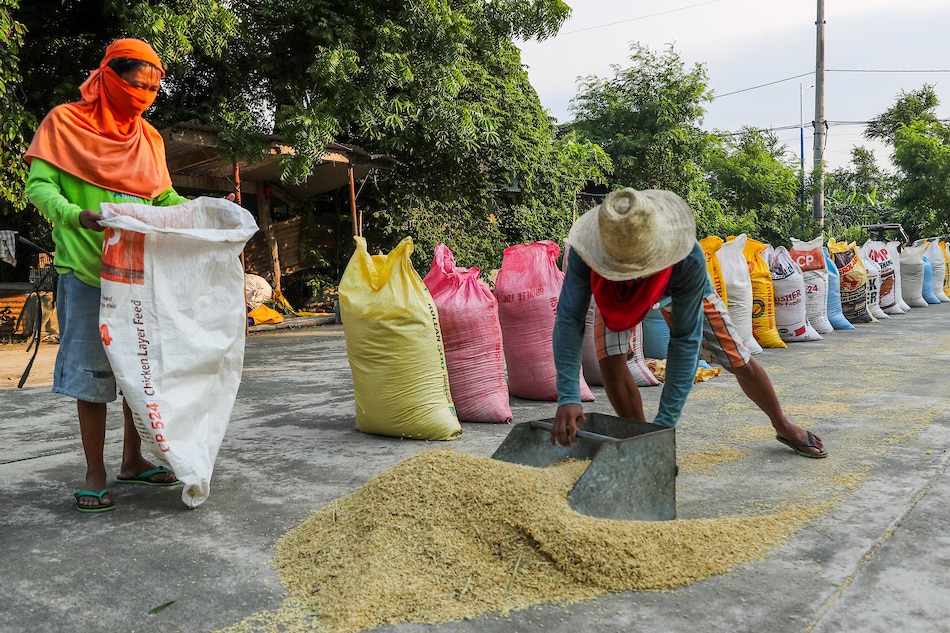DA: Rice production recovering after dip in self-sufficiency in 2022 | ABS-CBN
ADVERTISEMENT

Welcome, Kapamilya! We use cookies to improve your browsing experience. Continuing to use this site means you agree to our use of cookies. Tell me more!
DA: Rice production recovering after dip in self-sufficiency in 2022
DA: Rice production recovering after dip in self-sufficiency in 2022
Jervis Manahan,
ABS-CBN News
Published Oct 16, 2023 03:42 PM PHT
MANILA — The Department of Agriculture (DA) said Monday that Philippine rice production is recovering this year, after the country's rice self-sufficiency dipped in 2022.
MANILA — The Department of Agriculture (DA) said Monday that Philippine rice production is recovering this year, after the country's rice self-sufficiency dipped in 2022.
DA spokesperson Arnel De Mesa noted that rice self-sufficiency went down to 77 percent in 2022 from 82 percent in 2021. This is said to be a record-low in self-sufficiency in many years for the Philippines.
DA spokesperson Arnel De Mesa noted that rice self-sufficiency went down to 77 percent in 2022 from 82 percent in 2021. This is said to be a record-low in self-sufficiency in many years for the Philippines.
"Ang alam ko noong 2022 nagmahal iyong inputs, perhaps fertilizer inputs, and that could be one of the contributing factors," De Mesa said in a Stratbase ADR forum on food security.
"Ang alam ko noong 2022 nagmahal iyong inputs, perhaps fertilizer inputs, and that could be one of the contributing factors," De Mesa said in a Stratbase ADR forum on food security.
(What I know is that in 2022, inputs, perhaps fertilizer inputs, increased, and that could be one of the contributing factors.)
(What I know is that in 2022, inputs, perhaps fertilizer inputs, increased, and that could be one of the contributing factors.)
ADVERTISEMENT
But he said they are confident that the yield this year, especially the harvest this season, would be quite high.
But he said they are confident that the yield this year, especially the harvest this season, would be quite high.
"Una lumaki na ang ating area. Pangalawa malaki na rin ang binaba ng cost of inputs especially for rice," De Mesa said.
"Una lumaki na ang ating area. Pangalawa malaki na rin ang binaba ng cost of inputs especially for rice," De Mesa said.
(First, our area has grown. Second, the cost of inputs has been greatly reduced, especially for rice.)
(First, our area has grown. Second, the cost of inputs has been greatly reduced, especially for rice.)
The production output for rice and other commodities is measured by the Philippine Statistics Authority, and data is expected to be available next year.
The production output for rice and other commodities is measured by the Philippine Statistics Authority, and data is expected to be available next year.
The DA welcomes additional funding for their programs for 2024, saying this will boost productivity for both farmers and fisherfolk.
The DA welcomes additional funding for their programs for 2024, saying this will boost productivity for both farmers and fisherfolk.
They are also working to boost irrigation as a way to increase agricultural productivity in rice, especially in the face of El Niño.
They are also working to boost irrigation as a way to increase agricultural productivity in rice, especially in the face of El Niño.
"More than a million hectares ang hindi pa irrigated, 'yung pace ng irrigation ng NIA (National Irrigation Authority), it will take them several years para matapos," De Mesa said.
"More than a million hectares ang hindi pa irrigated, 'yung pace ng irrigation ng NIA (National Irrigation Authority), it will take them several years para matapos," De Mesa said.
(More than a million hectares are not yet irrigated. The pace of irrigation by the NIA (National Irrigation Authority) will take them several years to complete.
(More than a million hectares are not yet irrigated. The pace of irrigation by the NIA (National Irrigation Authority) will take them several years to complete.
ADVERTISEMENT
ADVERTISEMENT



